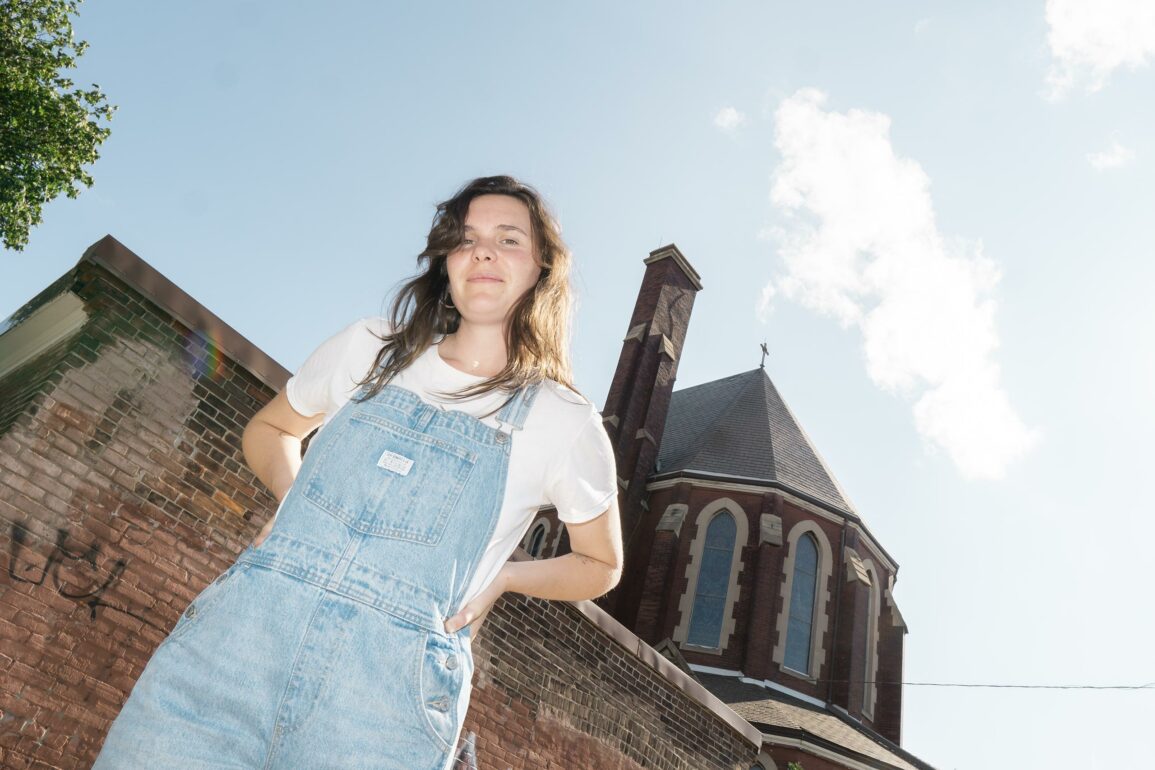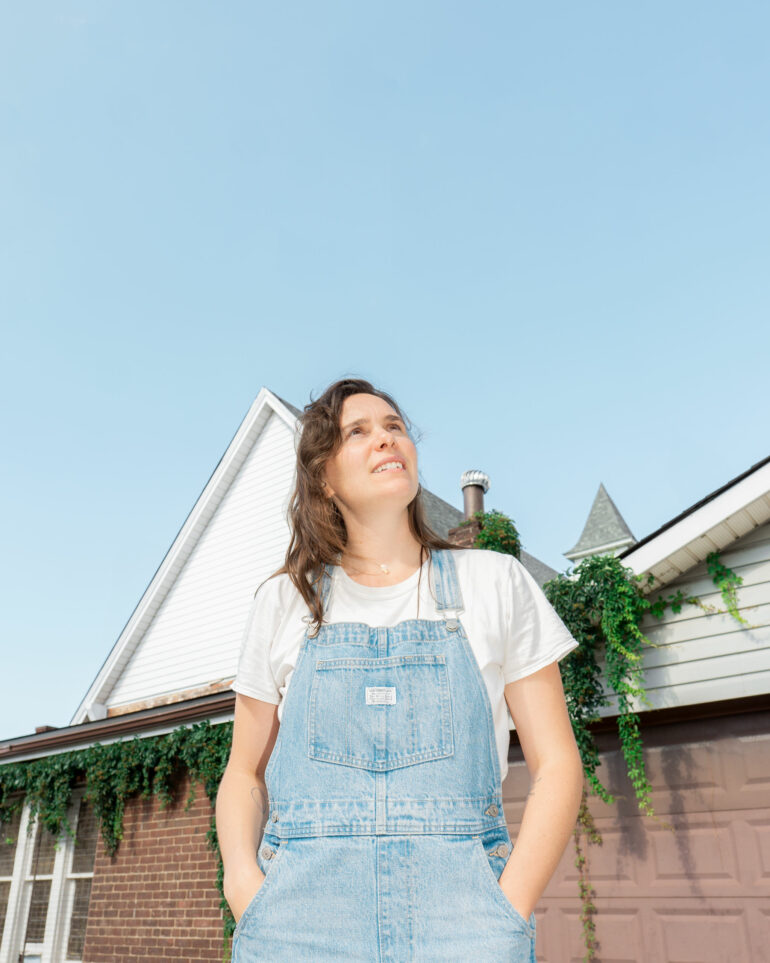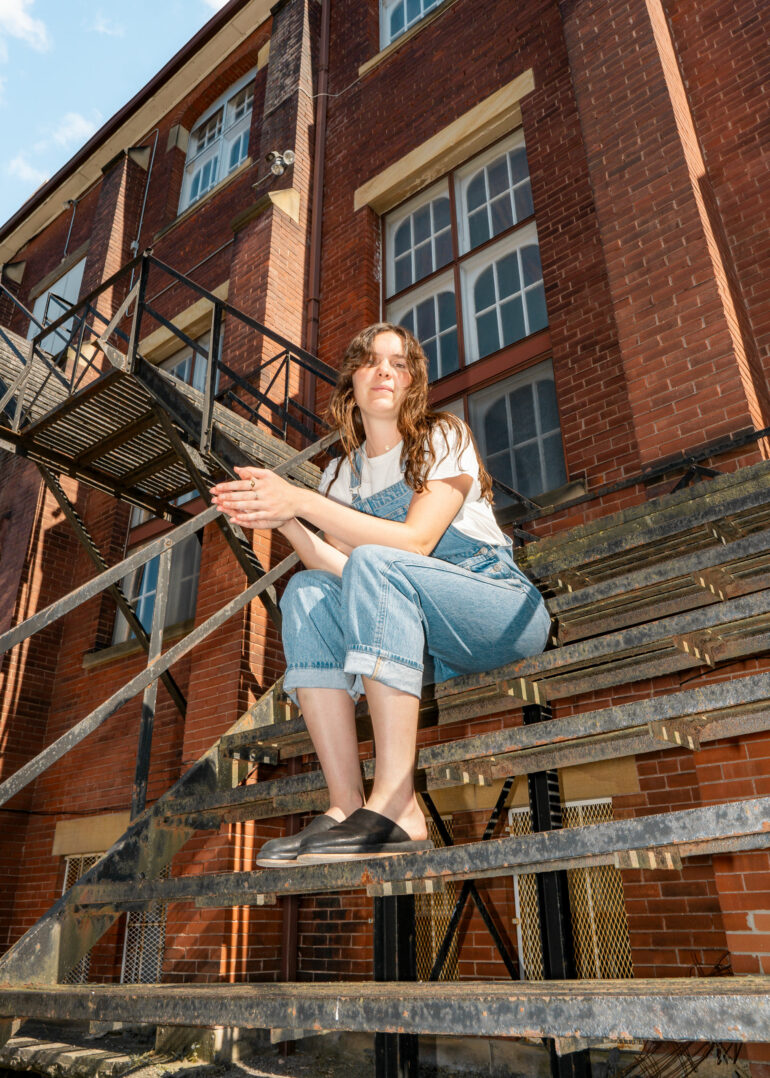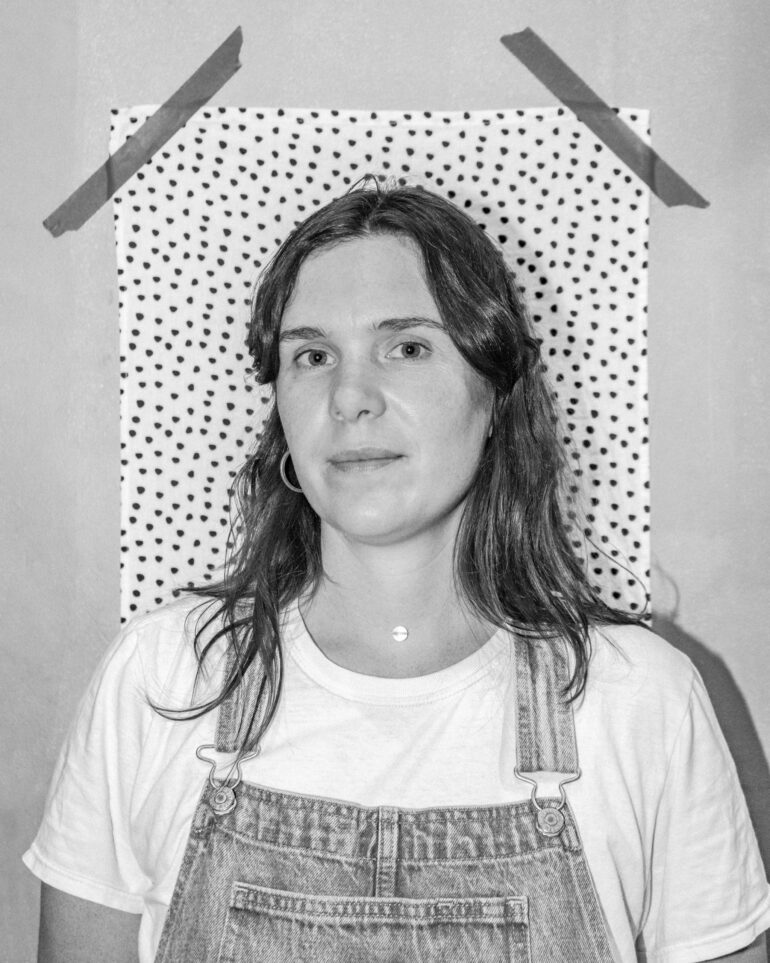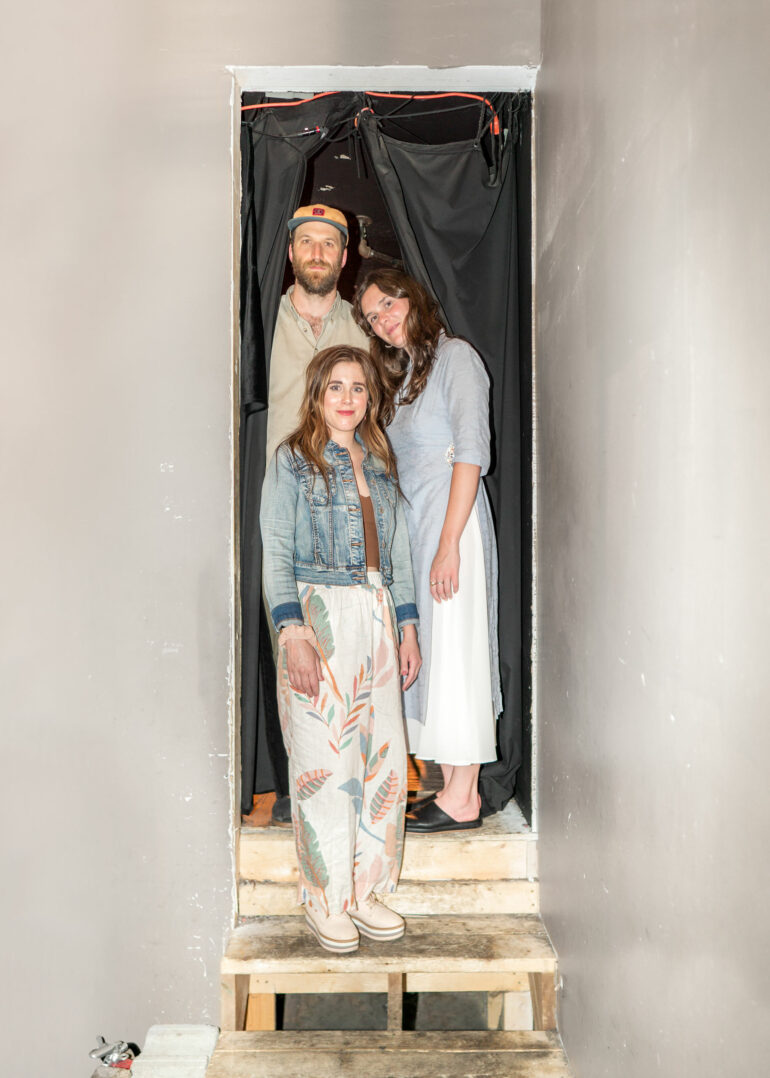In the 43 months since our last encounter with Nico Paulo, she has moved to Newfoundland, set up her own design studio, recorded and released her eponymous debut album—which made it onto the long list for the Polaris Music Prize. While touring in Toronto, Nico brought us up to speed.
.
LUSO LIFE: So we met at the end of 2019. You did that acoustic set at Mercado.
NICO PAULO: Oh my gosh right.
LL: I think that was November 2019 and then you moved right before Covid started wasn’t it?
NP: July 2020… That’s when I moved to St. John’s [Newfoundland].
LL: Oh, July. Okay. Yeah.
NP: Because the Luso Beat stuff happened after that. It happened after like where was it? It was in the winter. Yeah.
LL: Was it February? Yeah, but we met before that. Yeah, that’s right. And then you did the beat and then you moved.
NP: And then I moved.
LL: And I haven’t seen you since, then you write this freaking great album that was on the long list for the Polaris Music Prize. And I know it’s been a long thing, but let’s break down those 43 months since the last time I saw you—yes I did the math.
NP: We were so young. Well, I feel that I was already kind of getting ready to record something around the time the Beat thing happened. And one of the reasons why I engaged in that was because I thought, “I would love to, have more support to make a record. When I moved to St. John’s, there was not a lot of music happening because of Covid and I was more dedicated to design, so I opened a design shop. I have my own little studio downtown.
LL: Nice. You originally came to Canada to study design?
NP: No, to work. I did all my studies back in Lisbon. When I graduated, I moved here for an internship and was in Toronto for seven years. So you met me at the end of those seven years. My partner at the time [Tim Baker] was from St. John’s and the idea was to go there for the summer—we thought Covid was going to be more temporary than it was. To backtrack, I had released my EP and I toured it in Europe, this was after that Beat Series thing. Then we came back from tour, which was in March and then Covid happened. I had a show booked and it kept being pushed until eventually being canceled. So moving there was just like a temporary escape. but then I just fell in love with it… and I met really great musicians. I was like, still pursuing music and still working on songs but there was no pressure to play. I was just doing a lot of design work as well.
LL: I’ve never been to the East Coast but it reminds me of small town Portugal.
NP: It’s also very Nordic. It’s a mix of things, and yes, there’s big Portuguese heritage there as well, like the cod fishery. Before the moratorium happened in 1992, most of the cod in Portugal came from there… and I was born in ’92 so my memory of eating codfish was always from Norway. O bacalhau comes from Norway or Northern Europe.
So. Yeah then I just stayed there. At the end of the summer Tim asked, “should we go back to Toronto, get our stuff and move here for a year?” And I was like, “yeah, why not?” I had a good group of friends and a band that I was playing with and working on new stuff with, so we came here, we packed everything and we moved there. I’ve been there since. Life kept happening and we’re not together anymore, but he was part of the record. He and Joshua Van Tassel produced it—I had met Josh on tour before, he’s a brilliant drummer/percussionist and and we really wanted to work together and it just happened. And then, yeah, after you live in St. John’s for a year, you can apply for grants, so I applied for two grants and I got both of them and the record was funded by that.
LL: That’s great.
NP: Yeah, worked within a very specific time frame. I had twelve songs, so we recorded those twelve and ten made the cut. We went to Nova Scotia to record it because Josh had moved back to Lunenburg, Nova Scotia where he’s originally from. He had a studio in the works but didn’t get to completely finish it. So since we already had our things scheduled, we actually used his aunt’s cabin and turned it into a recording studio! We spent like ten days there and recorded the album—it was just the three of us.
LL: Just in the cabin? No way. Tell me more.
NP: Yeah it was just the three of us—we had a bass player come in for two days to do a session and that was it. We laid all the beds for the record then when I went back to St. John’s, we did overdubs with a clarinet player and the trumpets, some extra guitars and lots of backup singing.
LL: The backup singing is fantastic.
NP: The female backups, I sang and then there’s male backups as well and that’s Steve Maloney and Tim Baker. Steve is still part of my band today but he’s not on tour with us. He’s the drummer and he sings with me. I really wanted to take the band for the record release tour but it’s just so expensive.
LL: Right, Canada is tough to tour.
NP: Even to have three people out is tough. But, it’s not that like people know all that much about me [laughs]. This is like the first record I’ve released and it’s kind of appeared out of nowhere. It’s not that I’ve been part of the Toronto music community for a very long time.. and I don’t necessarily come from a musical family either. Even in Portugal, people are like, “what happened?” I always sang and I guess things just moved the way they had to, you know. So yeah, I’m still in St John’s and I love it there. Tim and I are not together anymore.
LL: I didn’t know that.
NP: Yeah, it’s been like a year and a half but it’s fine. We’re still friends. He’s very dedicated to his career. And I feel like we just wanted different things but we worked closely and we still do some stuff together. Like his record came out and I was still designing everything for his record release, the cover, his merch. We played a couple of shows around here last year—I actually opened for him at Massey Hall.
LL: Oh no way.
NP: Yeah, I did a solo set and we also played London. We’re still in each other’s lives you know, it takes a bit of time. A year is not that long and a year and a half isn’t much either. It’s going to take time to readjust. Especially because I moved there with him—I was introduced to his family, so it’s my family… it’s taking a minute to adjust to that because, well, that’s how life is, right?
LL: Exactly. Going back to what you had said about not having that musical background, I remember commenting on your guitar and you saying, “oh yeah, I just got this and I just learned how to play it.” So I know that you don’t have any formal music training.
NP: No, not even singing.
LL: Are you the type of person that this comes naturally to? Or do you enjoy living outside your comfort zone and go, “Oh, let me try that. Now let me move over here and try this other thing…”
NP: I think it’s a combination of the two, yeah. Singing has always been a part of my life—I always sang in different projects growing up. Somehow I always end up doing it… and it wasn’t even that I was looking for opportunities. It just happened that people knew that I sang because I sang everywhere—I wasn’t afraid. Sometimes there are kids that sing but they’re shy and their families are like, “Oh, sing a song. She has a beautiful voice,” but no one really knows… not me, I always sang.
LL: So you were up on chairs performing since day one?
NP: Yeah! I was never afraid of singing, and I was always very comfortable with it. I was in bands from like age 13 or 14. Playing songs for the the church festivals. Every year we would get together and play a song or two. Later on I moved to high school and had an actual band—a cover band. Then when I moved here, I felt the impact because I was like, I’ve been pursuing this design career that everyone was like, “go for it,” and music was never seen as that. It was always like a hobby. When I moved here, I didn’t know a lot of people and I missed it. I was just kind of on my own, so I picked up the guitar and was like, “I still want to do this, even if I do it on my own.” And that’s how these songs kind of came about.
LL: You were raised in Portugal but have been gone a while… What do you carry of it with you nowadays?
NP: I mean, I still feel very Portuguese. But I feel like I’m not thinking too much about it anymore.
LL: Sure. I don’t think most of us do.
NP: Yeah. It’s just part of me. It’s there. Of course, the fact that I have a sister with three kids in Portugal makes me want to go and spend more time there. I don’t necessarily think that I would move back, though I know, my parents live with that on the horizon. And they did… when they were here in the 80s, they were here temporarily. I don’t feel like I’m here temporarily… but I also don’t know. I’m open to anything that comes my way. I don’t feel like I’m just here waiting to going somewhere else. I’m here and I’m embracing it. I feel like this record is a bit of a result of that. You know?
LL: For sure. There was a little Portuguese thrown in your song Amor, Amor, Amor.
NP: Yeah!
LL: I was listening and thought, “Oh, she’s singing in Portuguese. Wait a minute, now she’s singing in French. Hold on, now English.” With language, how do you find writing in English versus Portuguese, having of course lived and studied in Portugal.
NP: I am very open to write in any language that I know. I wrote that song because it’s the three languages of my life. My dad grew up in France, so I have that connection to France forever. I spent a lot of time there and family from there spent time with us in Portugal, so I always have French around… although I’m a very shy French speaker, I can understand everything. I feel like that song is honouring the immigration pattern in the family, and I wanted everyone to understand it. So I did Portuguese and then French and then English—that was the idea.
LL: Fantastic. I love that.
NP: The song is kind of more serious in the beginning and it builds up and then there’s this like kind of party at the end. That was the spirit of the idea for that song.
LL: That one messed me up a bit… I was like, “where are those voices going?”
NP: Yeah yeah [laughs]. I like writing in Portuguese; it’s like any other thing, when you exercise something, then you get good. It just takes a moment to adjust.
LL: Again, pulling yourself out of the comfort zone.
NP: Yeah, I love it. I do have songs that I’ve written in Portuguese that I haven’t really tended to in a while, but I don’t know, there’s something easier for me with English. I feel like maybe it’s because I also grew up listening to more English music.
LL: Absolutely. Yeah, that makes sense.
NP: It’s just more inside my way of being… and I live here now! [laughs].
LL: Exactly. I read something about Nick Cave and the way he writes… he writes music in a really bland office—no windows, nothing on the walls, nothing. Nothing, nothing. So bizarre. He’s got a piano, a desk and something to type on. When I read that, I thought, I wonder how that compares to your process, because I’m sure it’s nothing like that. Like he treats it like work.
NP: Yeah, yeah, yeah, sitting at his desk at work. I don’t know if I have, like one way of writing yet. I haven’t found a formula that works always, you know. I feel like a lot of these songs came about almost like meditations. I was just strumming the guitar, and I would start singing, or I had this melody that I’d been singing and I found chords for it. But I feel like it doesn’t really matter where I am, you know what I mean? I know that there are writers that are very specific, like, “I need to go on a retreat and be in a cabin isolated from the world. And only then can I write.” There’s a song that I’m fiddling with now—there’s no name yet—but the theme is like being in love with the world again or something like that… and that song came about because I was singing something to a kid that came to visit my roommate last summer and I went to my bedroom and started playing it… and now I think I might have a song? It just depends. There are certain things that come to you and you have to grab them. Voice memos are very helpful. I find if I have ever an idea, I just sing to it so I don’t forget it. But I don’t think I have a specific formula. It can be anywhere. It’s normally influenced by the most ordinary situations.
LL: Is songwriting ever frustrating?
NP: No, no. Not yet. I don’t find it frustrating at all. I actually find it quite meditative. I’m very precious about it. I find it’s not an exercise yet for me. I feel like it might turn that way, and I appreciate when writers get very good—just marinating with songs and lyrics for a very long time. I don’t think I do that yet and I don’t know if I will…
LL: Paul McCartney is very old… It’s took him a long time to get there.
NP: I know imagine all those years, That’s great.
LL: So, something else that I read was from Patti Smith and it reminded me of you. She said, “When I started playing, I couldn’t sing very well. I couldn’t play an instrument. I didn’t know anything about technology. I’d never been in front of a microphone. I didn’t know shit, but I knew rock and roll and I did believe that it was mine.” So, regardless of her lack of training, she felt she had the right to get up and embrace it and, you know, share her feelings with the world. Right? Am I right? Does that match you?
NP: 100%. Well, this is the thing, I don’t don’t have training but I’ve also kept doing it for a reason. You know, there’s always something that guides us in a direction, and I feel lucky that I followed it. We all have something like that and a lot of people just think it’s foolish or childish or just unattainable… there’s like a lot of things that can get in our way. Fear makes it harder because there’s more at stake and there’s more responsibility and all of these things add up. There was always something inside that made me stay. And I feel that when I picked up the guitar, it was that. I didn’t know the guitar—I still don’t know the guitar very well, you know? I’m very transparent about it. It takes time to grow in any form. It’s especially hard these days. I find there’s so much of the same. There are so many similar projects and so many people doing the same thing. So it is sometimes scary. My family’s not musical, I don’t have a background in music. So like, I’m already losing something here but you gain in other ways!
LL: Absolutely. I find not having the background in some ways helps, right? I have no idea what I just did with my fingers. Is that an augmented chord? Is that a whatever… it just sounds great to my ears.
NP: This record was the chasing of sounds. I used my voice for a lot of the composing of the record. I knew what a lot of the guitar parts in songs like The Master and a lot of the piano parts in Lock Me Inside, would sound like before playing them and I would, like, sing the lines.
LL: António Variações used to do that.
NP: I didn’t know this! Really?!
LL: Yeah, yeah, yeah. There’s cassettes of him just going humming the different parts.
NP: Yeah. I just knew exactly what I was looking for and I had the right people around me too—that’s the other thing. So it was just a combination of a lot of cool things happening, I thought. I feel like musicians that have been trained or have been in bands for a while, sometimes get stuck in one way of doing things. So it was refreshing and it was mutually enriching, let’s say. I was like bringing these new ways of interpreting a song, and then they could apply their technical skills to the part. Sometimes, things were actually not possible because I’m singing it, but you only have so many right ways of expressing that on the guitar or like a trumpet, you know… but it was fun!
LISTEN TO NICO’S DEBUT E.P. NICO PAULO ON ALL STREAMING PLATFORMS NOW.
WORDS: DAVID GANHÃO
PHOTOS: MICHEAL NEAL
